Some of the greatest fortunes and empires in history were created by people who started with nothing. Today, we celebrate 25 of these iconic figures – businessmen, technology entrepreneurs, even celebrities and athletes – by recalling the tales of their rise to glory. Don’t feel bad if your favorites aren’t on the list, this is just a glimpse of the many visionaries we’ve seen throughout history and there are countless others who also deserve attention. While each of them took a slightly different path to financial greatness, virtually all of them started from very humble beginnings. In no particular order:
1. Henry Ford
 It’s tough to think of a man who carried the torch of business further than Henry Ford. Ford became famous for pioneering the assembly line and in the process, becoming the first man to successfully mass produce automobiles. Amazingly, Ford jump started the Ford Motor company with virtually none of his own money. As ‘Venture Capital Sources’ explains, Ford “raised a nominal sum of money from friends for initial working capital purposes. He then proceeded to cleverly negotiate deals with his suppliers that let him purchase parts on credit.
It’s tough to think of a man who carried the torch of business further than Henry Ford. Ford became famous for pioneering the assembly line and in the process, becoming the first man to successfully mass produce automobiles. Amazingly, Ford jump started the Ford Motor company with virtually none of his own money. As ‘Venture Capital Sources’ explains, Ford “raised a nominal sum of money from friends for initial working capital purposes. He then proceeded to cleverly negotiate deals with his suppliers that let him purchase parts on credit.This in turn motivated him to sell his cars quickly – at a profit – so as to repay his suppliers. After years of diligently reinvesting those profits back into the business, Ford Motor was an industrial giant – and its creator was forever immortalized as a business legend.
2. John Rockefeller
 John Rockefeller is the business titan behind Standard Oil. After scratching and scrimping to buy his first oil refinery in 1862, he was already a dominant force in the industry by the 1870′s. From there, he almost single-handedly revolutionized the mass market for oil. By offering discounts to the railroads that carried his oil cross-country, Rockefeller was able to, in turn, sell it to customers for low prices that were previously unheard of. This helped establish Rockefeller’s legacy as one of America’s earliest business heroes, and he is still celebrated for his “ability to refine crude oil to produce kerosene and other products better, cheaper, and in greater quantity than anyone thought possible.”
John Rockefeller is the business titan behind Standard Oil. After scratching and scrimping to buy his first oil refinery in 1862, he was already a dominant force in the industry by the 1870′s. From there, he almost single-handedly revolutionized the mass market for oil. By offering discounts to the railroads that carried his oil cross-country, Rockefeller was able to, in turn, sell it to customers for low prices that were previously unheard of. This helped establish Rockefeller’s legacy as one of America’s earliest business heroes, and he is still celebrated for his “ability to refine crude oil to produce kerosene and other products better, cheaper, and in greater quantity than anyone thought possible.”3. Andrew Carnegie
 Often referred to as the “king of steel”, Andrew Carnegie did for steel what John Rockefeller did for oil. His work in founding and operating U.S. Steel has earned him the reputation as the second wealthiest man in history. But long before that, Carnegie set to work as a lowly telegrapher in the 1850′s. By the 1860′s, his investments in railroads, bridges, and oil derricks (combined with a lucrative side job as a bond salesman. propelled him to build U.S. Steel into an enduring empire.
Often referred to as the “king of steel”, Andrew Carnegie did for steel what John Rockefeller did for oil. His work in founding and operating U.S. Steel has earned him the reputation as the second wealthiest man in history. But long before that, Carnegie set to work as a lowly telegrapher in the 1850′s. By the 1860′s, his investments in railroads, bridges, and oil derricks (combined with a lucrative side job as a bond salesman. propelled him to build U.S. Steel into an enduring empire.In the 1890′s, after much work and toil, Carnegie’s was the “largest and most profitable industrial enterprise in the world.” By the time he sold his company to J.P. Morgan in 1901, Carnegie was ready for a much-deserved retirement filled with generous philanthropy and charitable giving.
4. Thomas Edison
 While Thomas Edison is best known for inventing the modern electric lightbulb in 1878, he was one of the fathers of the modern electrical grid (Nikola Tesla was the other). The impact of this innovation has been staggering. Prior to the electrical grid, the only available lighting was sunlight during the day and gas-powered lamps at night. In 1882, however, Edison took the world by storm, introducing one of the first commercial electric grids in the world. As the Objective Standard observes, “within fifty years of Edison introducing the electric grid, gas light was all but forgotten, and electricity emerged as the power source for the masses.”
While Thomas Edison is best known for inventing the modern electric lightbulb in 1878, he was one of the fathers of the modern electrical grid (Nikola Tesla was the other). The impact of this innovation has been staggering. Prior to the electrical grid, the only available lighting was sunlight during the day and gas-powered lamps at night. In 1882, however, Edison took the world by storm, introducing one of the first commercial electric grids in the world. As the Objective Standard observes, “within fifty years of Edison introducing the electric grid, gas light was all but forgotten, and electricity emerged as the power source for the masses.”Like Andrew Carnegie, Edison got his start as a telegraph operator, gradually working his way up to more rewarding and personally satisfying projects.
5. Warren Buffett
 Warren Buffett is one of only two living men who can truthfully boast a larger fortune than Bill Gates. (In fact, the two are now teaming up on the largest charitable giving project in history.. He generated his larger-than-life $60 billion net worth by becoming one of Wall Street’s sharpest and most successful investors. His secret, as William Grieder writes in his book “The Soul of Capitalism” is that Buffet “stays close to his capital.” That is, he will not invest unless he personally meets with the top executives and completely buys into their business strategy.
Warren Buffett is one of only two living men who can truthfully boast a larger fortune than Bill Gates. (In fact, the two are now teaming up on the largest charitable giving project in history.. He generated his larger-than-life $60 billion net worth by becoming one of Wall Street’s sharpest and most successful investors. His secret, as William Grieder writes in his book “The Soul of Capitalism” is that Buffet “stays close to his capital.” That is, he will not invest unless he personally meets with the top executives and completely buys into their business strategy.This simple yet proven philosophy has served Buffet well, propelling him to previously unimaginable heights of wealth creation.
6. Sam Walton
 Sam Walton was the mastermind behind Wal-Mart. After opening his first store in 1962, Walton vowed to remake the retail industry in the vision of his radical cost-cutting philosophy. By 1966, his fledgling chain was up to 20 stores and growing fast. The real secret to Wal-Mart’s phenomenal growth, as TIME Magazine notes, is that Walton “may have been the first true information-aged CEO.” TIME goes on to observe that Walton was the first to hire a computer whiz to overhaul the company’s logistics and inventory systems, leading to unprecedented efficiency that enabled Wal-Mart to out compete virtually every department store in existence.
Sam Walton was the mastermind behind Wal-Mart. After opening his first store in 1962, Walton vowed to remake the retail industry in the vision of his radical cost-cutting philosophy. By 1966, his fledgling chain was up to 20 stores and growing fast. The real secret to Wal-Mart’s phenomenal growth, as TIME Magazine notes, is that Walton “may have been the first true information-aged CEO.” TIME goes on to observe that Walton was the first to hire a computer whiz to overhaul the company’s logistics and inventory systems, leading to unprecedented efficiency that enabled Wal-Mart to out compete virtually every department store in existence.7.Oprah Winfrey
What chances of success would you give a poor woman born in backwoods Mississippi to a single teenage mother, raised in inner-city Milwaukee, raped at nine years of age, then, at the age of 14, giving birth to a son who died shortly thereafter?Grim chances, we think. Unless that woman happens to be Oprah Winfrey. Oprah landed her first radio job in high school. She soon transferred to daytime talk TV, where, after success powering up ratings for a Chicago TV show, she started her own production company. That production company, Harpo, launched an empire. The Oprah Winfrey show is the highest-rated talk show in TV history, and has won her several Emmy Awards. She’s also an amazing philanthropist who donates a cut of her $1.3 billion net worth to a variety of causes benefitting women, children and families.
8. Lewis Ranieri
 Lewie Ranieri rose up from a lowly mail room job at ex-Wall Street titan Salomon Brothers all the way to the boardroom. Upon being asked to run the newly created mortgage bond department (a move he saw as a slap in the face., Ranieri proceeded to make said department not only the most profitable one at Salomon, but for a time, the most profitable on all of Wall Street. His unique insight was that consumer mortgages could be bundled together in pools of homogeneous risk (say, 30 year mortgages with $110,000 outstanding at 12% interest. that investors of all kinds would feel comfortable buying into.
Lewie Ranieri rose up from a lowly mail room job at ex-Wall Street titan Salomon Brothers all the way to the boardroom. Upon being asked to run the newly created mortgage bond department (a move he saw as a slap in the face., Ranieri proceeded to make said department not only the most profitable one at Salomon, but for a time, the most profitable on all of Wall Street. His unique insight was that consumer mortgages could be bundled together in pools of homogeneous risk (say, 30 year mortgages with $110,000 outstanding at 12% interest. that investors of all kinds would feel comfortable buying into.As the book “Liar’s Poker” tells it, Ranieri generated billions of dollars for Salomon and is often credited with jump-starting the entire mortgage securities market.
9. Michael Milken
Michael Milken was perhaps the first “corporate raider” in history. He made his name during the financial boom of the 1980′s by creating a market for junk bonds (the bonds of large yet under-performing corporations. Milken’s insight led him to buy junk bonds when they were cheap, knowing full well that the government would bail out these large corporations and allow him to reap huge profits when they did. According to Michael Lewis’ landmark text “Liar’s Poker”, Milken paid himself an annual salary of $550 million during his peak earning years. When all was said and done, Milken was estimated to have a net worth of over $1 billion – and a permanent legacy on Wall Street.10. Bill Gates
 No profile of the world’s prodigious wealth creators would be complete without Bill Gates. After dropping out of the nation’s top-ranked university (Harvard. because he “just couldn’t bring himself to go to class”, Gates ambitiously founded Microsoft with partner Paul Allen. The company originally set out to sell computer programming languages, but soon veered very far (and very profitably. off of that path. Instead, Microsoft created the now-ubiquitous Windows operating system that powers 90% of the world’s personal computers. Gates officially retired from Microsoft in 2008, exiting with a net worth of $58 billion and 3rd place on Forbes’ 100 Wealthiest People list.
No profile of the world’s prodigious wealth creators would be complete without Bill Gates. After dropping out of the nation’s top-ranked university (Harvard. because he “just couldn’t bring himself to go to class”, Gates ambitiously founded Microsoft with partner Paul Allen. The company originally set out to sell computer programming languages, but soon veered very far (and very profitably. off of that path. Instead, Microsoft created the now-ubiquitous Windows operating system that powers 90% of the world’s personal computers. Gates officially retired from Microsoft in 2008, exiting with a net worth of $58 billion and 3rd place on Forbes’ 100 Wealthiest People list.11. Steve Jobs
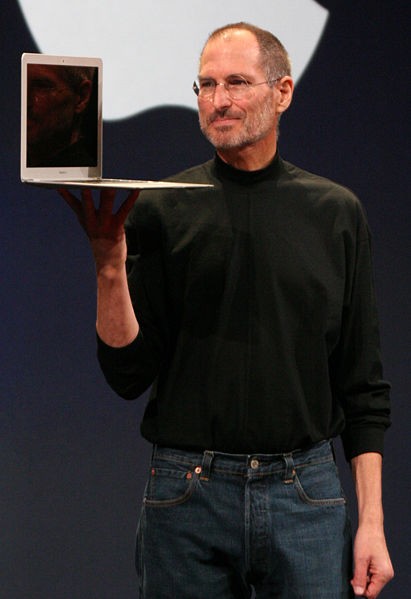 Much like Bill Gates, Steve Jobs left college on nothing more than the overwhelming feeling that he was not going to find his true calling there. In a now-famous commencement address (see below., Jobs explains that he “decided to drop out and trust that it would all work out okay.” Luckily for him and the rest of the computer-using world, it did. Jobs teamed up with engineering wiz Steve Wozniak to create the world’s first personal computer, leading to a wave of innovation that culminated in the Apple line of products. After being kicked out of the company he started, Jobs founded animated movie giant Pixar. He would later return Apple and spearhead a Renaissance led by the creation of the iPod.
Much like Bill Gates, Steve Jobs left college on nothing more than the overwhelming feeling that he was not going to find his true calling there. In a now-famous commencement address (see below., Jobs explains that he “decided to drop out and trust that it would all work out okay.” Luckily for him and the rest of the computer-using world, it did. Jobs teamed up with engineering wiz Steve Wozniak to create the world’s first personal computer, leading to a wave of innovation that culminated in the Apple line of products. After being kicked out of the company he started, Jobs founded animated movie giant Pixar. He would later return Apple and spearhead a Renaissance led by the creation of the iPod.An unauthorized biography of Job’s life and business career labeled Jobs as “the biggest second act in the history of business”, with the first being Bill Gates.
12. Steve Wozniak
 While Steve Jobs will probably always be the face of Apple Computer, Steve Wozniak was possibly even more critical to its success. In fact, the case can be made that the entire rise of personal computing hinged on Wozniak’s (or “Woz”, is he is also known. decision to follow his passion for engineering and literally invent the computer as we now know it. It wasn’t all rosy, though. To finance this expedition into the technological unknown, both Woz and Jobs had to sell some of their most prized personal possessions. For Woz, it was his HP Scientific Calculator; for Jobs, his Wolkswagen wan. Together, the two raised the $1,300 they needed to create the earliest Apple prototypes in Job’s tiny garage. The rest, as they say, is history.
While Steve Jobs will probably always be the face of Apple Computer, Steve Wozniak was possibly even more critical to its success. In fact, the case can be made that the entire rise of personal computing hinged on Wozniak’s (or “Woz”, is he is also known. decision to follow his passion for engineering and literally invent the computer as we now know it. It wasn’t all rosy, though. To finance this expedition into the technological unknown, both Woz and Jobs had to sell some of their most prized personal possessions. For Woz, it was his HP Scientific Calculator; for Jobs, his Wolkswagen wan. Together, the two raised the $1,300 they needed to create the earliest Apple prototypes in Job’s tiny garage. The rest, as they say, is history.While Wozniak is no longer affiliated with Apple, there is no denying Wozniak’s crucial role in building the empire the company now is.
13. William Hewlett and David Packard
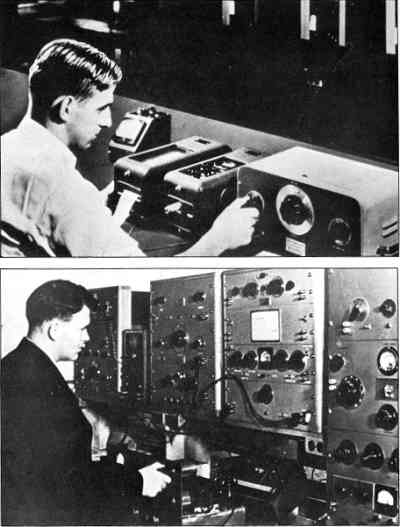 Hewlett-Packard is another storybook, “it all started in a garage” tale that sounds, at first blush, to be impossible. After starting the company in 1939 with a mere $538 (you read that right, five hundred and thirty eight dollars., the hardworking pair patiently build their fledgling startup into the personal computing behemoth it is today. By 1959, the company had gone public, eventually narrowing their focus from a broad range of electronic products onto semiconductors. Today, HP is a household name with $107 billion in 2007 revenue.
Hewlett-Packard is another storybook, “it all started in a garage” tale that sounds, at first blush, to be impossible. After starting the company in 1939 with a mere $538 (you read that right, five hundred and thirty eight dollars., the hardworking pair patiently build their fledgling startup into the personal computing behemoth it is today. By 1959, the company had gone public, eventually narrowing their focus from a broad range of electronic products onto semiconductors. Today, HP is a household name with $107 billion in 2007 revenue.14. Sergey Brin/Larry Page
 Brin and Page, like so many tech entrepreneurs before them, felt the unshakable urge to leave college for bigger and better things. For these two aspiring Stanford PhD’s, that thing was Google. This hailed the beginning of a major technological shift on the Internet. In his eye-opening book “The Search”, Wired.com editor John Battelle explains the story of how “Google rewrote the rules of business and transformed our culture.” Of course, life wasn’t so easy for the pair before their billion-dollar IPO in 2004. In fact, Google might have never progressed past the point of an ambitious dorm room project if not for a $100,000 check from Sun co-founder Andy Bechtolsheim. Today, the trailblazing success of Google has enabled Brin and Page to reach billionaire status by their 30′s.
Brin and Page, like so many tech entrepreneurs before them, felt the unshakable urge to leave college for bigger and better things. For these two aspiring Stanford PhD’s, that thing was Google. This hailed the beginning of a major technological shift on the Internet. In his eye-opening book “The Search”, Wired.com editor John Battelle explains the story of how “Google rewrote the rules of business and transformed our culture.” Of course, life wasn’t so easy for the pair before their billion-dollar IPO in 2004. In fact, Google might have never progressed past the point of an ambitious dorm room project if not for a $100,000 check from Sun co-founder Andy Bechtolsheim. Today, the trailblazing success of Google has enabled Brin and Page to reach billionaire status by their 30′s.15. Jerry Yang and David Filo
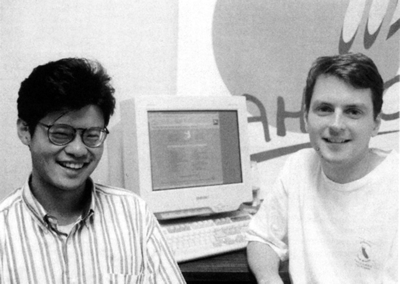 Today, Yahoo! is one of the world’s top search engines, with $7 billion in 2007 revenue and operating income of $730 million. But it wasn’t long ago that the ultra-popular web portal was nothing more than side project between a couple of college students. According to Jessica Livingston’s book “Founders at Work”, tamford University’s Jerry Yang and David Filo originally created their search technology for their own personal use. There was no easy way to find information on their school’s network, so the pair created a crawler that would track down what they needed and make it easily searchable. It all snowballed from there, as Yahoo! traded a mind-blowing $118 per share just prior to the 2000′s tech stock crash.
Today, Yahoo! is one of the world’s top search engines, with $7 billion in 2007 revenue and operating income of $730 million. But it wasn’t long ago that the ultra-popular web portal was nothing more than side project between a couple of college students. According to Jessica Livingston’s book “Founders at Work”, tamford University’s Jerry Yang and David Filo originally created their search technology for their own personal use. There was no easy way to find information on their school’s network, so the pair created a crawler that would track down what they needed and make it easily searchable. It all snowballed from there, as Yahoo! traded a mind-blowing $118 per share just prior to the 2000′s tech stock crash.Today, Yahoo! is being fought over by Google and Microsoft, each of whom is eager to lavish $40 billion+ in a quest to buy or partner with them.
16. Niklas Zennström
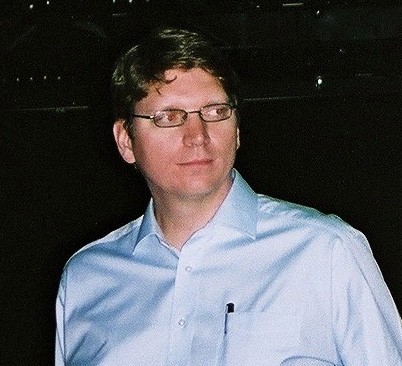 This Swedish entreprenuer had no idea what a wild ride he was in for when he raised the curtain on his biggest creation. As the co-founder of KaZaA Media Desktop, Zennstrom found himself in the crosshairs of the recording and film industry after his program became the most popular way of trading multimedia files over the Internet. The scrutiny and lawsuit threats became so intense that Zennstrom left the United States and ultimately sold KaZaA to another company. But Zennstrom wasn’t done; just a year later, he was hard at work creating Skype, an Internet telephony service based on the same P2P technology used for KaZaA. It didn’t take long for Skype to catch on, prompting auction giant eBay to fork over a whopping $2.6 billion to snap up the young company.
This Swedish entreprenuer had no idea what a wild ride he was in for when he raised the curtain on his biggest creation. As the co-founder of KaZaA Media Desktop, Zennstrom found himself in the crosshairs of the recording and film industry after his program became the most popular way of trading multimedia files over the Internet. The scrutiny and lawsuit threats became so intense that Zennstrom left the United States and ultimately sold KaZaA to another company. But Zennstrom wasn’t done; just a year later, he was hard at work creating Skype, an Internet telephony service based on the same P2P technology used for KaZaA. It didn’t take long for Skype to catch on, prompting auction giant eBay to fork over a whopping $2.6 billion to snap up the young company.17. Mark Zuckerberg
 Continuing in the technology entrepreneur vein, we arrive at Mark Zuckerberg. The now 24 year old Harvard dropout (noticing a pattern here?. is the man behind Facebook, which, while not yet on Microsoft or Google’s level, is undoubtedly an empire. A Wired article entitled “How Mark Zuckerberg Turned Facebook Into the Web’s Hottest Platform” notes that Zuckerberg “.” In fact, Facebook is now such a force to be reckoned with that there are entire companies going into business and acquiring venture funding to create applications that work with the site.
Continuing in the technology entrepreneur vein, we arrive at Mark Zuckerberg. The now 24 year old Harvard dropout (noticing a pattern here?. is the man behind Facebook, which, while not yet on Microsoft or Google’s level, is undoubtedly an empire. A Wired article entitled “How Mark Zuckerberg Turned Facebook Into the Web’s Hottest Platform” notes that Zuckerberg “.” In fact, Facebook is now such a force to be reckoned with that there are entire companies going into business and acquiring venture funding to create applications that work with the site.18. David Beckham
 Beckham is the highly touted soccer star who made headlines by leaving the Real Madrid for the bright lights of United States soccer. Like Tiger Woods, Beckham has continued the emerging trend of athletes capitalizing more on their image than their athletic ability. BeckhamWatch.com clocks his yearly salary at a cool $37.4 million, in addition to the following endorsements:
Beckham is the highly touted soccer star who made headlines by leaving the Real Madrid for the bright lights of United States soccer. Like Tiger Woods, Beckham has continued the emerging trend of athletes capitalizing more on their image than their athletic ability. BeckhamWatch.com clocks his yearly salary at a cool $37.4 million, in addition to the following endorsements:Vodaphone ($1.8 million., Rage Software ($2.7 million., Japanese TV ($500,000., Police Sunglasses ($1.8 million., Pepsi ($3.6 million., Adidas ($5.4 million., Gillette ($7.5 million.
19. Alex Rodriguez
 The top athletic empire on our list is undoubtedly Alex Rodriguez, the sensational shortstop who took Major League Baseball by storm as a 21 year old, slick gloved, home run hitting rookie. After several seasons of consistently ranking among baseball’s top performers, Rodriguez parlayed his power hitting pedigree into a $250 million, 10 year contract in 2000 with the Texas Rangers – a record for any athlete in any sport. But Alex wasn’t done cashing in. In 2007, he excersized an opt-out clause in his contract which enabled him to re-up with the New York Yankees for another record deal. This time, A-Rod signed a new record-breaking contract worth more than $300 million over 10 years. This doesn’t even count the money recieved from endorsements, which are unknown to the general public.
The top athletic empire on our list is undoubtedly Alex Rodriguez, the sensational shortstop who took Major League Baseball by storm as a 21 year old, slick gloved, home run hitting rookie. After several seasons of consistently ranking among baseball’s top performers, Rodriguez parlayed his power hitting pedigree into a $250 million, 10 year contract in 2000 with the Texas Rangers – a record for any athlete in any sport. But Alex wasn’t done cashing in. In 2007, he excersized an opt-out clause in his contract which enabled him to re-up with the New York Yankees for another record deal. This time, A-Rod signed a new record-breaking contract worth more than $300 million over 10 years. This doesn’t even count the money recieved from endorsements, which are unknown to the general public.Not a bad outcome for a guy who grew up without his father in a New Jersey suburb!
20. Tiger Woods
 While A-Rod might have the largest playing contract in Sports History, Tiger Woods has probably outgrossed him with endorsements. The iconic golf superstar has become what ESPN called “golf’s $6 billion man“, as well as possibly the world’s first billion dollar athlete. Rick Burton, the University of Oregon’s resident marketing guru, opined in heavy agreement with ESPN’s assessment:
While A-Rod might have the largest playing contract in Sports History, Tiger Woods has probably outgrossed him with endorsements. The iconic golf superstar has become what ESPN called “golf’s $6 billion man“, as well as possibly the world’s first billion dollar athlete. Rick Burton, the University of Oregon’s resident marketing guru, opined in heavy agreement with ESPN’s assessment:“Tiger Woods is the perfect earner,” says Burton. “Think of him as the offspring of Arnold Palmer and Michael Jordan.”
Unlike many athletes, who are content with a huge one-time payoff for their endorsement services, Tiger took a different approach. In order to get his face on a cereal box or a shoe commercial, he demanded an equity stake in the business itself. This has enabled him to commercialize his image to a level previously unheard of.
21. Scott Boras
 Today, Scott Boras is perhaps best known as the man who negotiated Alex Rodriguez’s two record-smashing baseball contracts. However, to baseball enthusiasts, Boras had already long-established his presence as the most aggressive and successful sports agent of all time. As the head of California-based Scott Boras Corporation, Boras has created an entire concierge of services around the players he represents, including athletic trainers, sports psychologists, ties to the most profitable sneaker and equipment endorsements and more. In his book “License to Deal”, Jerry Crasnick writes that Boras has probably negotiated over $1 billion worth of contracts and endorsement deals for the baseball players in his stable.
Today, Scott Boras is perhaps best known as the man who negotiated Alex Rodriguez’s two record-smashing baseball contracts. However, to baseball enthusiasts, Boras had already long-established his presence as the most aggressive and successful sports agent of all time. As the head of California-based Scott Boras Corporation, Boras has created an entire concierge of services around the players he represents, including athletic trainers, sports psychologists, ties to the most profitable sneaker and equipment endorsements and more. In his book “License to Deal”, Jerry Crasnick writes that Boras has probably negotiated over $1 billion worth of contracts and endorsement deals for the baseball players in his stable.Amazingly, Boras created his entire empire from little more than a law degree and the intuition that he could be a successful agent. Since becoming successful, he has turned down even more lucrative deals to represent Hollywood actors and stars from other sports to devote full attention to his baseball playing clients.
22. Mark Cuban
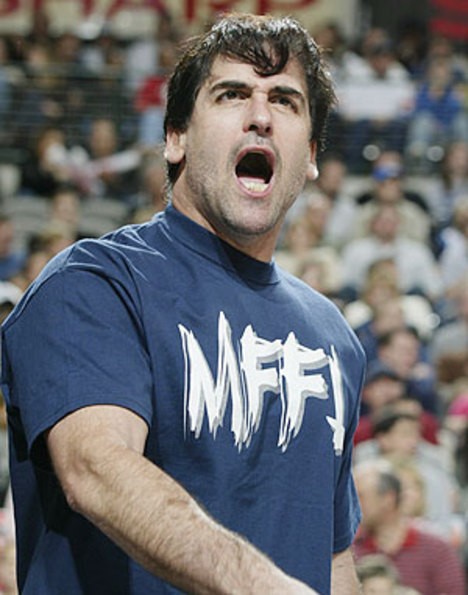 The Dallas Mavericks owner has created an empire around both his mega riches and explosive, controversial personality. His outspoken blog has earned him several fines from NBA Commissioner David Stern and his business ventures have brought him fabulous success. It wasn’t always so rosy for Cuban, however. He grew up in a Jewish working class family (his father was an automobile upholsterer. in a Pittsburgh suburb, where the young boy’s first foray into business was selling trash bags to raise money for expensive basketball sneakers. From this small speed sprang a lifetime of business ambition, culminating in the founding and sale of an Internet company that led to his purchase of the Mavericks basketball team.
The Dallas Mavericks owner has created an empire around both his mega riches and explosive, controversial personality. His outspoken blog has earned him several fines from NBA Commissioner David Stern and his business ventures have brought him fabulous success. It wasn’t always so rosy for Cuban, however. He grew up in a Jewish working class family (his father was an automobile upholsterer. in a Pittsburgh suburb, where the young boy’s first foray into business was selling trash bags to raise money for expensive basketball sneakers. From this small speed sprang a lifetime of business ambition, culminating in the founding and sale of an Internet company that led to his purchase of the Mavericks basketball team.Cuban is now set for life, a billionaire by age 49 who is also a founding owner of the HDNet cable network.
23. Eddie Van Halen
 Another trailblazing performer with an immortal, cash-gorging empire is guitar virtuoso Eddie Van Halen. After immigrating Netherlands with little money and practically no grasp of the English language, Eddie found his passion in music by training with his brother, Alex, to become trained concert pianists – at age nine. By his teen years, Eddie had taken up the guitar, which, according to Alex, he could be found playing “from the minute he wakes up ’till the minute he goes to sleep.” All that practice time paid off in spades when Eddie and Alex formed the rock band Van Halen. The bombastic, guitar-heavy quartet would go on to redefine the genre and drop the world’s first RIAA Diamond-Certified album, amassing hundreds of millions of dollars in the process.
Another trailblazing performer with an immortal, cash-gorging empire is guitar virtuoso Eddie Van Halen. After immigrating Netherlands with little money and practically no grasp of the English language, Eddie found his passion in music by training with his brother, Alex, to become trained concert pianists – at age nine. By his teen years, Eddie had taken up the guitar, which, according to Alex, he could be found playing “from the minute he wakes up ’till the minute he goes to sleep.” All that practice time paid off in spades when Eddie and Alex formed the rock band Van Halen. The bombastic, guitar-heavy quartet would go on to redefine the genre and drop the world’s first RIAA Diamond-Certified album, amassing hundreds of millions of dollars in the process.The Van Halen empire is alive and well into 2008, with the band having just capped the highest grossing tour in their history
24. Madonna
Madonna is one of the wealthiest, empire-building celebrities to ever draw breath. The “Like a Virgin” superstar is often spoken of as “one of the greatest pop acts of all time” and “the Queen of Pop” by Rolling Stone magazine. The Recording Industry Association of America taps her as the top-selling female rock artist of the twentieth century and the second top-selling female artist in the U.S. with over 63 million records sold to date. According to the Guiness Book of World Records, Madonna boasts a net worth of over $400 million on the strength of 200+ million album sales around the world.25. Ayn Rand
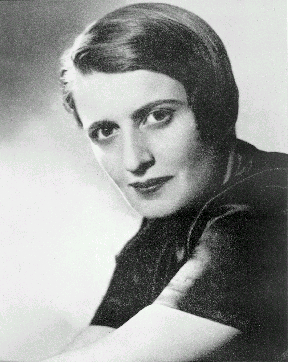 Ayn Rand may have the most humble origins of anyone so far mentioned. She grew up in tzarist Russia, just in time to see her father’s successful pharmacy confiscated by the invading Bolsheviks and her family made to flee the country. She began to despise the totalitarian environment she had always known, and boldly left for the United States at age 21, on a student visa. Her goal upon arrival was to make a name for herself as a Hollywood writer. After writing several plays, however, she realized that her true talents were found in fiction writing. Having penned such enduring best-sellers as “The Fountainhead” and “Atlas Shrugged”, as well as becoming a trusted friend and advisor to former Federal Reserve chairman Alan Greenspan, Rand is now recognized as one of the most influential fiction writers of all time.
Ayn Rand may have the most humble origins of anyone so far mentioned. She grew up in tzarist Russia, just in time to see her father’s successful pharmacy confiscated by the invading Bolsheviks and her family made to flee the country. She began to despise the totalitarian environment she had always known, and boldly left for the United States at age 21, on a student visa. Her goal upon arrival was to make a name for herself as a Hollywood writer. After writing several plays, however, she realized that her true talents were found in fiction writing. Having penned such enduring best-sellers as “The Fountainhead” and “Atlas Shrugged”, as well as becoming a trusted friend and advisor to former Federal Reserve chairman Alan Greenspan, Rand is now recognized as one of the most influential fiction writers of all time.One survey, by the Library of Congress, found that book readers ranked “Atlas Shrugged” as the second most influential book in their lives after the Bible.
 21.06
21.06
 rina ^_^
rina ^_^







0 komentar:
Posting Komentar